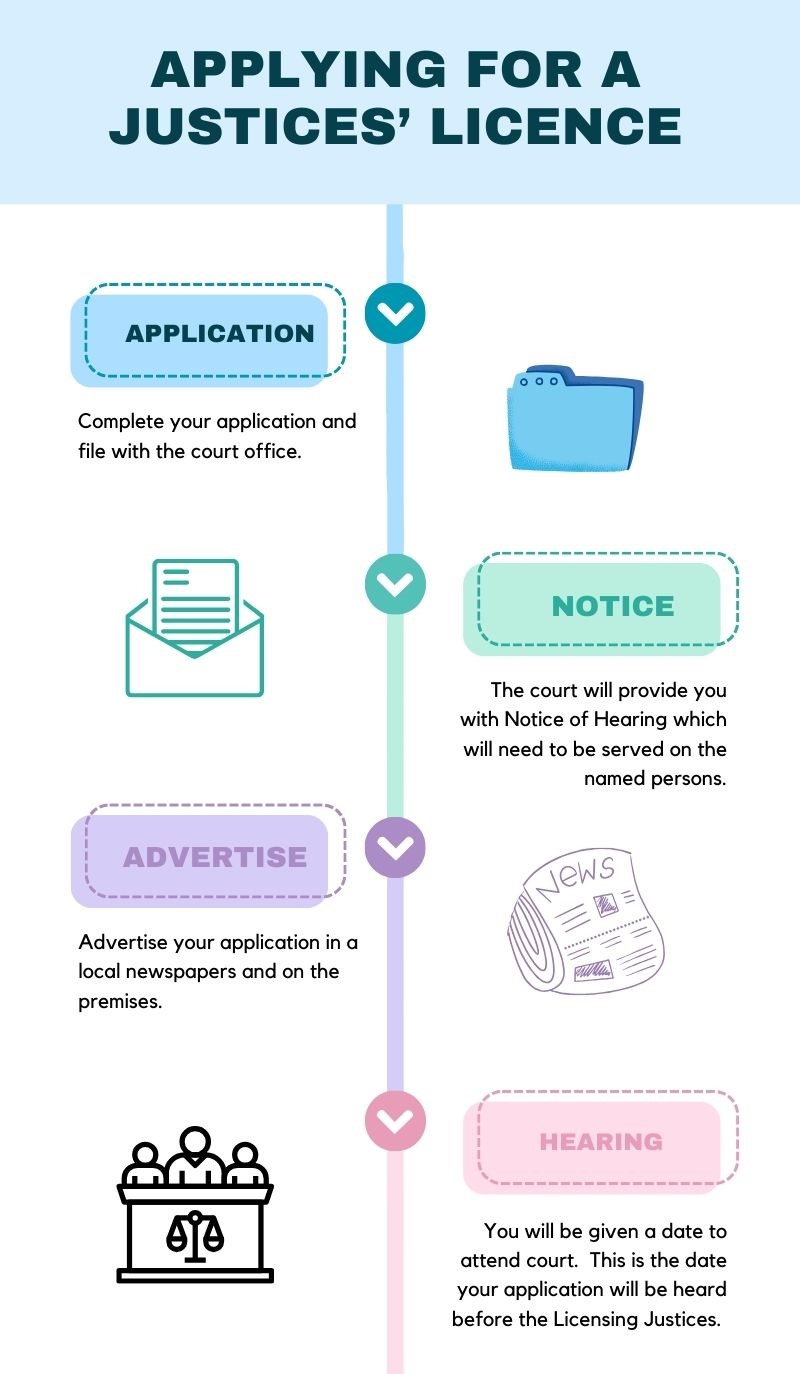Justices' Licences
There are 4 types of Justices' Licence:
- On-Licence
- Off-Licence
- Part V
- Occasional
On-Licence
An on-licence is defined in the Licensing Ordinance 1994 ("the Ordinance") as authorising the sale for consumption either on or off the premises for which the licence is granted. This type of licence would be considered appropriate for a 'pub' or 'bar' type business.
Off-Licence
The Ordinance defines an off-licence as authorising the sale for consumption off the premises. This type of licence would be considered most appropriate for a 'shop' type business, or a wholesaler.
Part V
There are 3 types of Part V licence:
Restaurant only
Residential only
Restaurant and Residential
A Part V licence authorises the sale of intoxicating liquor to a bone fide guest and/or as ancillary to a main meal. These types of licence would be most appropriate for a restaurant, bed and breakfast or hotel type business.
How to apply
To apply for a Justices' On-Licence, Off-Licence or Part V you will need to complete the relevant application form and file it with the court with any application fee. Once the application is filed, you will be given a hearing date for your application. You will also be required to notify the Chief Police Officer, Chief Fire Officer and Chief Executive of your application and hearing date. In addition, you will need to advertise your application on the premises and in a newspaper circulating the Falkland Islands. At your hearing, you will need to show the court proof that you have met these requirements. At your hearing, you will need to give evidence on oath. The Licensing Justices will then make a decision.
Occasional Licence
An Occasional Licence gives a person permission to sell intoxicating liqour at a specific event in premises which would not ordinarily be licensed.
An application for an Occasional Licence can be made by filing an application with the court with any applicable fee. Once received, the Clerk to the Summary Court will notify the Chief Police Officer of your application and advertise it on the Court List. If no objections to your application are received by a specified date (usualy 7 days after your application is filed) the Clerk to the Summary Court may deal with your application administratively (without a hearing). If any objections are received, the Clerk to the Summary Court will notify you of the substance of the objection and the time and date for the hearing of your application before the Licensing Justices.

More Licences
Extensions of Permitted Hours
For premises with a Justices' On-Licence, it is possible to apply to extend your permitted hours for sale of intoxicating liquor. The Ordinance states that this may only be done for a special occasion.
The Ordinance provides some guidance about what a 'special occasion' may be. It states that a special occasion is one which
- creates a potential demand for liqour by those participating in it; and
- does not regularly occur or recur throughout the year; and
- is a function which may be classed as a special occasion but recurs so often it ceases to be a special occasion.
Examples of a special occasion given are Christmas Eve or New Year's Eve. It also states that a weekly darts match would not be a special occasion.
Applications may be submitted to the court office. Any application received will be sent to the Chief Police Officer for any comment and advertised on the court list for 7 days. If no objections are received, the Clerk to the Summary Court will deal with your application. If any objections are received, your application will be listed for hearing before the Licensing Justices.
More Information
Under 18s are permitted into a premises which has a Justices' Off-Licence or a Part V Licence.
To be permitted into a premises with a Justices On-Licence, there must be a valid children's certificate in place.
To be permitted into a premises with a Club Registration Certificate in place, there must be a Camp Exemption Order or statutory exemption.
Special Hours Certificates
A special hours certificate is available to a premises with a licence and its purpose is to extend the permitted hours for sale to allow for entertainment of music and dancing or live music entertainment. It permits an extension up to when the music and dancing finishes or 1am at the latest. For a premises to be granted a special hours certificate, the premises must be suitable for music and dancing, or for live music.
A special hours certificate may be granted for use on;
• A particular day, or days, or the week; or
• Particular periods of the year; or
• To exclude its use of particular day or days of the year.
As a licence holder you are required to notify the chief police officer 7 days before you use the special hours certificate.
For example, you have a music and dancing event organised for Thursday 14th. You must notify the chief police officer by Thursday 7th that you are intending to use your special hours certificate on Thursday 14th and include details of the event.
Protection Order
A Protection Order may be applied for if you are a person who is also applying to transfer a licence into your name from someone else. The purpose of a Protection Order, is to 'protect' the current licence holder from the actions of the 'new' licence holder during the application period of the transfer application. This means, for example, if the 'new' licence holder commits an offence (such as serving intoxicating liqour to someone under the age of 18 years), it will be the 'new' licence holder who is held responsible, rather than the current licence holder.
There is no obligation to make this application if applying for a Transfer.
An application for a Protection Order will be listed within 10 days of the date of filing with the court.
Transfers
In a number of circumstances, it is possible to transfer a Justices' Licence into the name of someone else. These are:
|
1. The holder of the licence has died and you are their personal representative/new tenant or occupier of the premises. |
|
2. The holder of the licences is incapable through illness or other infirmity of carrying on the business under the licence and you are the assign/new tenant or occupier of the premises. |
|
3. The holder of the licence has been adjudged bankrupt or has made a voluntary arrangement with his creditors or a trustee has been appointed under a deed of arrangement and you are the trustee of the bankrupts estate/supervisor of the voluntary arrangement/new tenant or occupier of the premises. |
|
4. The holder of the licence has given up or is about to give up, or their representatives have given up or are about to give up, occupation of the premises and you are the new tenant or occupier of the premises. |
|
5. The occupier of the premises, being about to quit them, has given notice of their intention not to apply for a renewal of a licence and you are the new tenant or occupier of the premises. |
|
6. The owner of the premises, or some person on their behalf, has been granted a protection order and you are the owner or other person applying on his behalf. |
